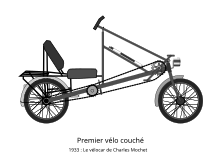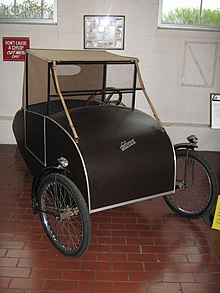Velocar
Velocar was the name given to velomobiles made in the 1930s and 1940s by Mochet et Cie of Puteaux, France and colloquially to the company's recumbent bicycles.
Charles Mochet [fr] was the inventive maker of lightweight powered cyclecars (Le P'tit Auto) and pedal-powered cars (quadricycles), mainly two-seaters, built on a tubular-steel chassis with bicycle-sized wheels, variable gears, and aerodynamic bodywork, in effect a faired-in "sociable".
However, Mochet's stroke of genius was to make what was the first performance recumbent bicycle, or vélo couché, using a design that was based on half of his four-wheeled Velocar.
Although Mochet had verified with the Union Cycliste Internationale (UCI) and the Union Vélocipédique de France [fr] (UVF) that his recumbents were completely legal for competition, they were declared ineligible at a later hearing and permanently banned from competition by cycling's governing body, the UCI, it is thought at the behest of the makers of standard upright cycles.
Re-discovery of the Mochet concept in California in the late 1970s led to the subsequent development of recumbent cycles that took place in the US in the 1980s.


